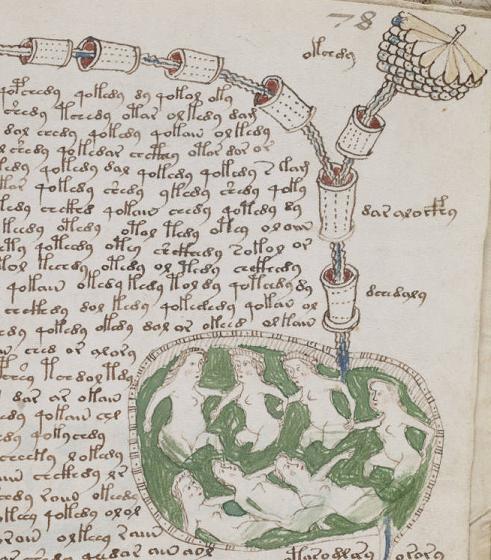The Voynich MS is a document of unknown origin, written in an unknown script and unknown language, by almost all accounts still completely undeciphered. Dated to roughly the Renaissance period, its earliest known mention is in records from the Bohemian court in Prague of the 16th century. There are 1,900 paragraphs and 37,000 words across 228 pages, with illustrations of plants, stars, and quasi-biological figures.
Letters
The alphabet (if it is that) is very charming, and is used in a confident and consistent fashion throughout the document. Since no translation is available, and the glyphs may not represent sounds at all, a system of convenient transliteration has been standardized in the EVA system (European Voynich Alphabet). In this system, each glyph/symbol has been mapped to a Latin letter, based on similarity of shape, and with a satisfactory mix of consonants and vowels to enable the original glyphs to be easily recognized and the words to appear vaguely readable. This system also enables computerized analysis.
The glyphs appearing 100 times or more in the MS are shown here with their EVA assignment:


special combos 
Another dozen glyphs appear rarely, some of them only once. Some of those appear solo, and may be abbreviations or decorative symbols. The rest, given below, may be variations of more common glyphs, or simply stand for rare phonemes or morphemes:
I have written some notes regarding the VMS, and remain convinced the document will one day be understood to some extent – if a translation is not possible, then at least a better understanding will emerge of how language works.
Examples
1. A paragraph from folio 67:2. Lines from folio 108, in a regularized font:
Transliteration of same using the EVA system:
teeodaiin.shey.epairody.osaiin.yteeoey.shey.epaiin.o,aiin
daiir.okeody.qoek***y.sar.oeteody.oteey.keey.keo.keeodal
ycheo.s.***.cheos.aiin.okesoe.ar.am.shees.dalaiin.dam
cheo!daiin.**ekeey.s!ar.air.s!oar.cheey.dair.cthey=
3. Intriguing image of folio 78 (all originals at Yale University):


